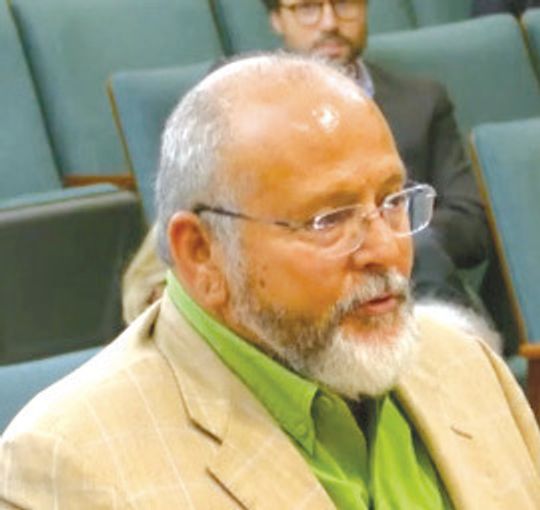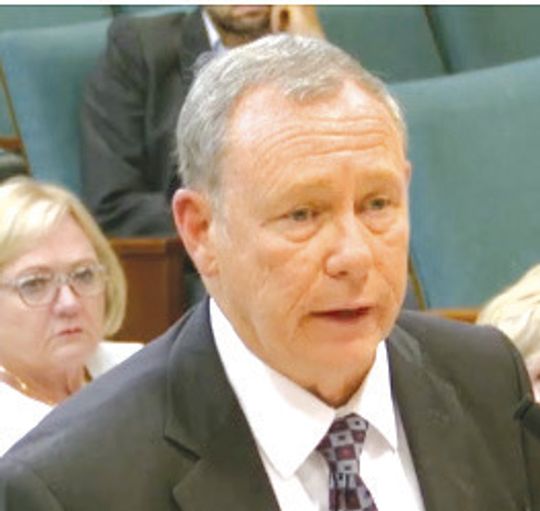Nearly two dozen Burnet County residents traveled to the Texas Capitol April 24 to offer insight to a committee about the impact of aggregate mining on their communities.
Texas Environmental Regulation Committee Chairman Brooke Landgraf welcomed State Rep. Terry Wilson (HD-20) to talk about his proposed legislation Texas House Bill 5151. If passed, the law would prohibit aggregate mining operations within four miles of two state parks and a camping venue in Burnet County.
Wilson revealed that deregulation in the early 2000s has resulted in a proliferation of mining operations throughout the state as closer to home.
“This beloved area of natural wonder is under threat,” Wilson said. “I’m not up here to speak ill of the aggregate production industry or the men and women who work there.
“They are crucial for our state. It’s that very need that caused Texas to deregulate that industry in 2005 – counting on the good will of the industry to follow the spirit of the law in exchange for minimal standard permitting requirements and the complete removal of the contested case hearing process that is standard practice for many other permits.”
“The fact is with this growth, we need aggregate production. We need it now more than ever. We need concrete. We need stones to build our homes. While we build and dig we can’t lose sight of why people from all over the country, from all over the world are visiting this very location.”
Fermin Ortiz of Texans for Responsible Aggregate Mining (TRAM) also offered insight into water and blasting issues.
“When they’re blasting above a bunch a caverns and the fissures start, the water is going to drop, and the water is not going to work for all us ranchers,” said Ortiz. “We’re already hauling water. We’re already in a drought. They’re talking about trying to use 50-, 60-, 80,000 gallons per day to make these models work that TCEQ approved. That’s not going to work. That water is going to run out.
“There are no controls after the fact,” he added. “Our beautiful natural resources – clean water and clean air. We can’t replace that.”
The bill specifies protection for Longhorn Cavern State Park, opened on 645 acres in 1932 and designated as a natural landmark in 1971; Inks Lake State Park, more than a thousand acres; Camp Longhorn built in 1939 adjacent to both state parks as well as nearby waterways Lake LBJ and Inks Lake.
Wilson described the areas visited by people from around the state and nation as Texas’ “dwindling number of irreplaceable natural refuges.”
He said of deregulation: “When one bad actor repeatedly pushes the bounds of that social contract, it is necessary for the people to push back, especially when the company that owns and operates the mine has no connection to the local community.”
Randy Printz with saveburnet.com offered the committee insight into the community’s opposition to a planned quarry operation in Hoover’s Valley in Burnet County.
He shared that in a December 2024 TCEQ public meeting on a quarry permit for Asphalt Inc./CPI 850 attended and listened to 15 experts but with few answers.
“They couldn’t answer any of the questions. They did not know where air quality monitors were. They didn’t know anything about how far they were, which ones one,” he said. “The ones they referenced didn’t actually work. Also, they said they put no air monitors in Burnet because of cost.”
He detailed how his committee for saveburnet. com has installed their own air quality monitors for data collection purposes. (Find related story on Page 1).
“Saveburnet.com we have 10 of them active in Burnet County right now. It goes to the web and it’s fully accessible to anyone online,” Printz said. “When the winds comes from the south from Marble Falls to Burnet, our monitors go from green which is good air to marginal to unhealthy.
“There’s three quarries already from 7-9 miles from Inks Lake State Park and Longhorn Caverns. Now you’re going to put something that’s three miles away.”
The status of the bill is pending in the 89th Texas Legislative Session which goes through June 2.














